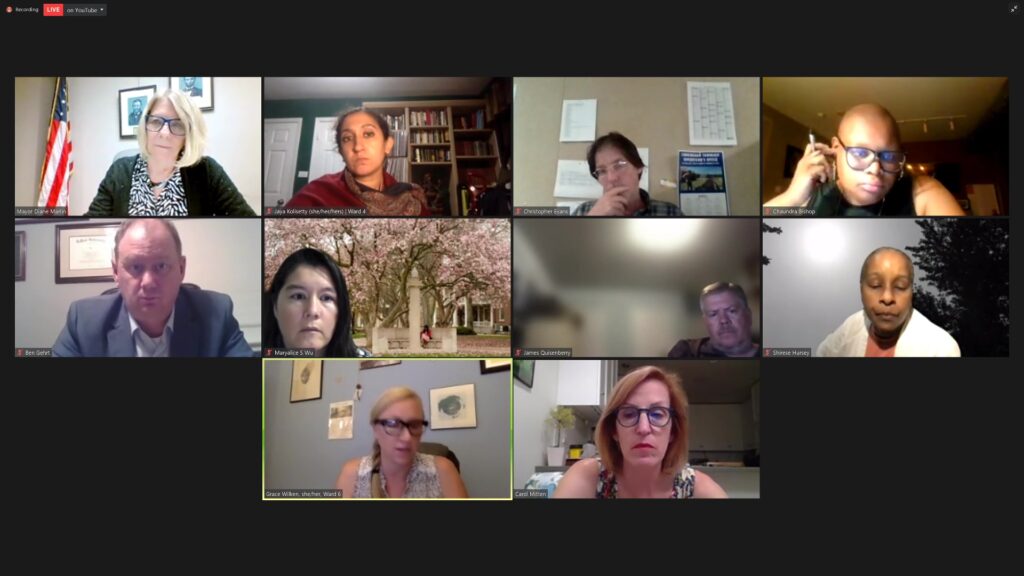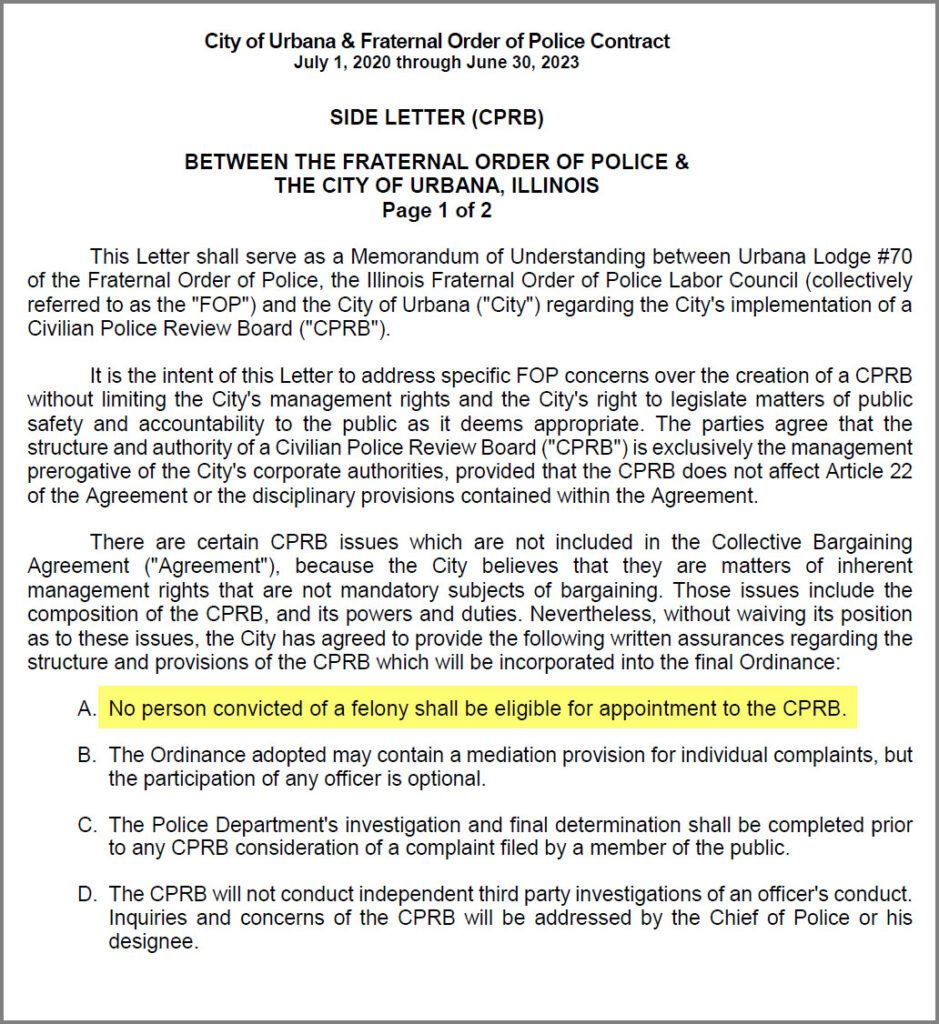
On September 13th, the Urbana City Council voted on a new Fraternal Order of Police (FOP) contract which effectively locked out any police reform efforts for the next two years.
The new FOP contract is largely similar to the prior one, which expired and was automatically renewed on July 1st, 2020. The new contract retroactively increases police pay (a change which costs the City of Urbana $485,000), and makes some minor procedural changes to bring Urbana’s dated police policies up to date with state law.
Surprisingly, the new FOP contract contains requirements that are made very plainly unlawful by the Urbana Human Rights Ordinance. An attached “Memorandum of Understanding” at the end of the 64 page contract makes clear that the City cannot allow any past convicted felons to serve on the Urbana Civilian Police Review Board (CPRB).

Such a restriction directly violates Urbana’s Human Rights Ordinance, which specifically names prior arrest or conviction history as a protected class type. The discriminatory restriction existed in the prior FOP contract, but Mayor Diane Marlin’s legal team had always argued that the City did not need to comply with the same Human Rights Laws that applied to everyone else in Urbana.
However, on March 8th, 2021 the Urbana City Council modified the Human Rights Ordinance to make it very clear that the City shall conform to its own Human Rights laws. At the same time, however, they voted to remove mechanism for accountability should the City violate the Ordinance. Exempting themselves from accountability seems to have worked out exactly as one might suspect.
Despite the City’s recent and very well-advertised claims of being anti-discrimination, the Urbana City Council decided to vote for the new FOP contract which contains explicit discriminatory language. Council members Christopher Evans and Chaundra Bishop voted against the new FOP contract, but Jaya Kolisetty, Maryalice Wu, James Quisenberry, Shirese Hursey, and Grace Wilken voted in favor of the contract (note: Wilken voted “present”, which counted as a yes vote).
During public input before the vote, several concerned Urbana residents urged the City Council not to approve a police contract which violated Urbana’s Human Rights Ordinance, but that did not appear to sway anyone’s vote. In response to the residents’ criticisms, police apologist Ben Gehrt, whom the City hired to orchestrate the FOP contract, claimed that it would be impossible to change any FOP contract details without sparking an arbitration process.
Neither Mayor Marlin, nor City staff, nor the City Council members attempted to confer with the CPRB or the Human Relations Commission before approving the discriminatory requirements. In fact, the long-held understanding was that the convicted felon prohibition would be removed.
Members of the CPRB had been discussing the removal of this discriminatory language for more than a year, and had even passed a resolution to advise the City Council to remove that language from the Ordinance. On April 12th, 2021 CPRB members Tony Allegretti and Scott Dossett gave a presentation to the City Council advising the removal of the discriminatory language. Mayor Marlin closed the discussion by saying “eventually, you’ll see some recommendations for changes to the [CPRB] Ordinance”. The April 12th presentation can be viewed here:

Probably the best articulation of why the felony ban is improper:
“I write this letter as a resident of Urbana, not as a representative of the Urbana Human Relations Commission, which I chair.
I have recently become aware that due to a clause in the City’s contract with the Police union, no person with a felony conviction is permitted to serve on the CPRB. Presumably because members of the Police Dept. are City employees and thus cannot serve on that Board, this was seen as somehow leveling the playing field. But setting up this equivalence is fallacious, prejudicial, and irredeemably discriminatory. Residents of Urbana with felony convictions have civil rights that no valid contract can abridge. This includes serving on a volunteer public body if appointed. The fact that individuals with felony convictions do not have the right to serve on the CPRB demonstrates to me that the City remains unclear on the fact and the reason that prior conviction is a protected class. It can be argued that individuals who are irrationally hostile to the police (prejudice against the police) are not desirable members of a Board whose mission is to be objective about police behavior; that’s fine. But the class of people with felony convictions is not identical to the set of people who cannot be fair or objective in evaluating police behavior any more than it is identical to the class of people dangerous to rent to or undesirable to hire. The cornerstone of the Urbana Human Rights Ordinance is that individuals have the right to be judged individually, especially those who are members of classes who have been discriminated against unfairly in the past. Using felony conviction as a marker for an inability to be objective about law enforcement is unfair, lazy, regressive, and yes on its face illegal in Urbana.
Furthermore, there is no conclusive evidence that all people with felony convictions are (never mind uniquely are) irrationally hostile to law enforcement, as would be required to establish the lawful exclusion of the entire class from the Board. It is an assumption based on a stereotype, which is the familiar basis of prejudice and unlawful discrimination.
I am shocked that the City still fails to grasp basic truths about what it means to be a protected class and has seen fit to endorse and implement a discriminatory practice.
Frances Rigberg”